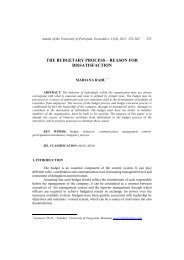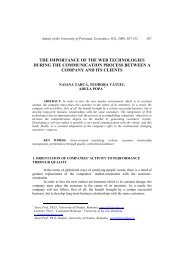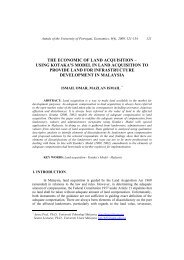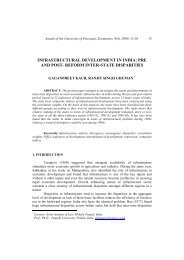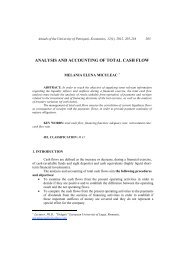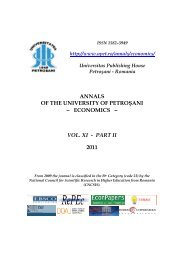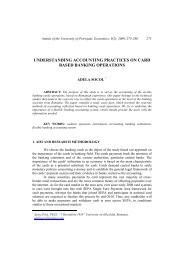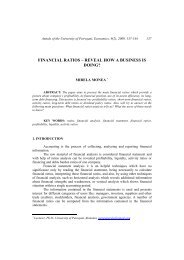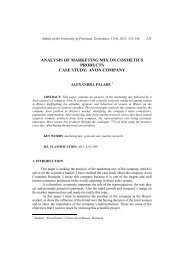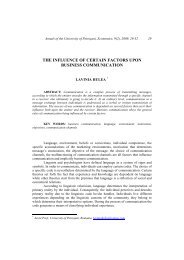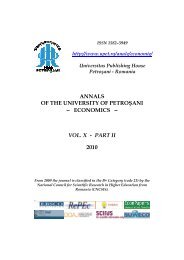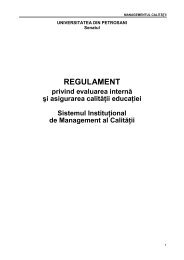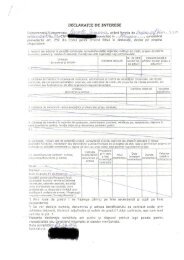annals of the university of petroÅani â¼ economics â¼ vol. xi - part i ...
annals of the university of petroÅani â¼ economics â¼ vol. xi - part i ...
annals of the university of petroÅani â¼ economics â¼ vol. xi - part i ...
Create successful ePaper yourself
Turn your PDF publications into a flip-book with our unique Google optimized e-Paper software.
286 Vătavu, S.; Pirtea, M.; Vătavu, S.<br />
authorities quickly observe <strong>the</strong> troubled banks, but creating a deposit insurance helps<br />
even troubled banks increase <strong>the</strong>ir pr<strong>of</strong>its (Walter, 2005).<br />
As seen from <strong>the</strong> US and <strong>the</strong> UK study, governments share different opinions<br />
on <strong>the</strong> consequences <strong>of</strong> <strong>the</strong> banks failure if <strong>the</strong>se are considered indispensable for <strong>the</strong><br />
system. The true <strong>part</strong> <strong>of</strong> “too big to fail” myth has been known since <strong>the</strong> 1930s crisis:<br />
when a big bank fails with no consideration to its clients, especially creditors, <strong>the</strong><br />
breakdown may engage a crucial recession as an effect <strong>of</strong> panic and surprising market<br />
decrease. However, it is crucial to understand <strong>the</strong> role <strong>of</strong> that bank in <strong>the</strong> economy at<br />
that certain moment.<br />
6. CONCLUSIONS<br />
The big banks losses undermine <strong>the</strong> worldwide economy, but even if bank<br />
pr<strong>of</strong>its are not nationalised, letting <strong>the</strong> banking system crash is not a solution.<br />
Authorities are also responsible when governments fail to monitor banking activities,<br />
and losses are so big that <strong>the</strong>y produce a financial crisis.<br />
One <strong>of</strong> <strong>the</strong> most challenging things to fulfill is to keep <strong>the</strong> transparency <strong>of</strong><br />
information, so that investors are aware <strong>of</strong> <strong>the</strong> organisations performance, and <strong>the</strong><br />
regulators apply new rules and limitations in order to improve <strong>the</strong> banking activity.<br />
Banks take huge risks for pr<strong>of</strong>its increase, as <strong>the</strong>ir insolvency stage usually transforms<br />
into a nationalisation <strong>of</strong> losses. The moral hazard appears when banks play an<br />
important role in <strong>the</strong> system, <strong>the</strong>y gamble for recovery, or governments set deposits<br />
insurance. Ei<strong>the</strong>r way, banks should be constrained in terms <strong>of</strong> risk, o<strong>the</strong>rwise <strong>the</strong><br />
losses continue growing.<br />
During financial crisis, governments used different ways to support banks, but<br />
it appears that however big <strong>the</strong> bailout would be, banks always need more help.<br />
Taxpayers usually complain about government help, as individuals do not get any<br />
benefits from bank activities. A perfect global banking model cannot be provided, but<br />
it is crucial for <strong>the</strong> economies to monitor <strong>the</strong>ir financial systems and provide related<br />
regulations in order to avoid future big losses.<br />
REFERENCES:<br />
[1]. Banerji, S.; Van Long, N. (2007) Moral hazards, bankruptcy costs, and international<br />
financial capital mobility, Review <strong>of</strong> Development Economics, 11(2), pp.369–384<br />
[2]. Beck, T. (2003) The incentive-compatible design <strong>of</strong> deposit insurance and bank failure<br />
resolution. Concepts and country studies, [Online] Available at: http://wwwwds.worldbank.org/external/default/WDSContentServer/IW3P/IB/2003/05/23/00009494<br />
6_03051404103547/Rendered/PDF/multi0page.pdf [Accessed 14 November 2009]<br />
[3]. Bolger, A. (2009) Scottish recovery set to rail rest <strong>of</strong> UK, Financial Times, [Online],<br />
Available at: http://www.ft.com/cms/s/0/abd4103e-dd14-11de-ad60-00144feabdc0.html,<br />
[Accessed 25 November 2009]<br />
[4]. Butler, P. (2009) Learning from financial regulation mistakes. McKinsey Quarterly, 3,<br />
pp.68-74<br />
[5]. Chandrasekhar, C.P. (2009) Learning from <strong>the</strong> crisis: Is <strong>the</strong>re a model for global<br />
banking, [Online], Available at: http://www.networkideas.org/ideasact/feb09/<br />
Beijing_Conference_09/C.P._Chandrasekhar.pdf, [Accessed 24 November 2009]



